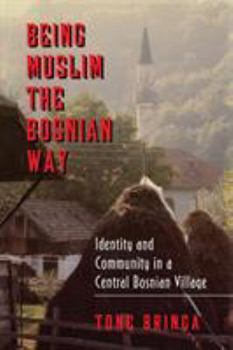Being Muslim the Bosnian Way: Identity and Community in a Central Bosnian Village
(Part of the Princeton Studies in Muslim Politics Series)
"I have been able to follow a Bosnian community over a period of six years, during which it has undergone dramatic changes. In the late 1980s people were working hard against economic crisis. In 1990 they were full of optimism for the future. In January 1993 the village was in fear, surrounded by war on all sides. In April 1993 it was attacked by Croat forces. In October 1993 none of the Muslims in the village remained. They had either fled, been placed in detention camps, or been killed."
Thus begins Tone Bringa's moving ethnographic account of Bosnian Muslims' lives in a rural village located near Sarajevo. Although they represent a majority of the population in the Republic of Bosnia and Herzegovina, Bosnian Muslims are still members of a minority culture in the region that was once Yugoslavia. The question of ethno- national identity has become paramount in this society, and the author focuses on religion as the defining characteristic of identity. Bringa pays particular attention to the roles that women play in defining Muslim identities, and she examines the importance of the household as a Muslim identity sphere. In so doing, she illuminates larger issues of what constitutes "nationality." This is a gripping and heartfelt account of a community that has been torn apart by ethno-political conflict. It will attract readers of all backgrounds who want to learn more about one of the most intractable wars of the late twentieth century and the people who have been so tragically affected.Format:Paperback
Language:English
ISBN:0691001758
ISBN13:9780691001753
Release Date:October 1995
Publisher:Princeton University Press
Length:312 Pages
Weight:1.02 lbs.
Dimensions:0.8" x 6.2" x 9.2"
Customer Reviews
4 ratings
Excellent description of Bosnian Muslims
Published by Thriftbooks.com User , 19 years ago
Over the past three years I've become close to a Bosnian Muslim extended family living in Central Texas. This past summer I was invited to spent almost 3 weeks in the Sanski Most area. About two years ago I read this book, and it has been invaluable in helping me understand customs practiced in Bosnia, and to some extent practiced in the U.S. when practical. I gave the book to one of the youth who is having a problem adjusting to U.S. life. She found some solace in having a snapshot of a life she never fully lived as she had to leave when she was 7 years old. The book is well written, engaging, and more importantly, reflects the life of these rural Muslim Bosnians very accurately.
an extremely useful work
Published by Thriftbooks.com User , 19 years ago
Bringa provides here a very readable and accessible discussion of identity boundaries in a mixed Muslim/Catholic village during the period directly before the Bosnian War. Her chapter on the history and historiography of Bosnian identity is, I think, the best piece available on the subject. Her treatment of local culture and local boundaries is warmly written and scholarly... in the best tradition of anthropological literature. I have used this course in an undergraduate seminar I taught to very good effect. The students enjoyed the book and seemed to get a lot out of it. This book is not a primer on the Bosnian War, nor does it attempt to make a global explanation for why that war occurred. It is however a tremendous resource on Bosnian Muslim culture and a very important contribution to the literature on identity and cultural boundaries. For those interested in such issues, I can give this work a very strong recommendation.
A unique book that is well worth reading
Published by Thriftbooks.com User , 22 years ago
Filled with observation of the Muslim and (to a lesser extent) Croat culture of a typical mixed Muslim-Croat village in central Bosnia. The author, a Norwegian anthropologist, had done fieldwork in Bosnia-Hercegovina during the five years preceding the 1992-1995 wars. She wrote the book during those wars and after the village that she had studied had been destroyed. Well worth reading. (I discovered Bringa as I was writing Untangling Bosnia and Hercegovina, a book about post-war Bosnia and Hercegovina. I found her book to be an absolutely unique and valuable resource.)
An excellent case study of interethnic relations
Published by Thriftbooks.com User , 24 years ago
Bringa, a lecturer of social anthropology at Bergen University of Norway, conducted extensive fieldwork over a period of six years in a mixed Croat-Muslim village in Central Bosnia. Through careful ethnography she has observed the ways in which such concepts as "ethnos", "nation", and "religion" were understood by, and effected the Bosnians with whom she studied. She demonstrates the complexities of interethnic relations on a micro-level. This study helps question overarching theories of nationalism, which exaggerate the difference between different nations. This study is detailed, well-researched and well-written. Despite its detail, it can be highly recommended for anybody working on or interested in Bosnia, former Yugoslavia and interethnic relations.





